Terry Odell's Blog, page 261
January 25, 2012
What's Cooking Wednesday - Tomato-Spinach Soup
What I'm reading: Contest entry #3 of 8
Thanks to Mike for his great post yesterday. Remember, there's still plenty of time to comment on both my Monday post and his Tuesday's post to enter to win books. And another reminder about my POV workshop at Savvy Authors. I'll be giving books away there, too. If you know someone who might benefit from a basic craft workshop, point them that way. I'm blogging about it today at their site . Please pop over.
And, I'm still open to more easy gluten-free desserts for our neighbors. I live in the boonies, so fancy ingredients, like gluten-free flours, are hard to come by. Likewise, baking at 9100 feet presents its own challenges, so I try to steer away from cakes.
My books always include food. Sometimes, however, the scene doesn't end up on the page of the final product, as is the case with Sadie's Tomato-Spinach Soup. In my Pine Hills series, Sarah often eats at Sadie's. One of her favorite things for lunch is their Tomato-Spinach Soup. I'll be making this one for our monthly dinner pot luck on Friday. (In truth, the original recipe, which I've varied, came not from "Sadie" but from Sandra McDonald, my first writing mentor.)
"Sadie's" Tomato-Spinach SoupIngredients
Vegetable cooking spray
1 ½ teaspoons olive oil
¾ c chopped onion
1 garlic clove, minced
1 ½ cups salsa
1 c fresh tomato, chopped
2 14.5 oz cans diced tomatoes
1 10-3/4 oz can condensed tomato soup, undiluted
1 10 oz package frozen chopped spinach, thawed
Directions
Coat a Dutch oven with cooking spray; add olive oil, and place over medium-high heat until hot.
Add the onion and garlic, saute for 2 minutes.
Add remaining ingredients; bring to a boil.
Cover, reduce heat, and simmer 10 minutes or until thoroughly heated. Yield: 4 servings (serving size: 1 cup)
Like this post? Please share by clicking one of the links below.
Thanks to Mike for his great post yesterday. Remember, there's still plenty of time to comment on both my Monday post and his Tuesday's post to enter to win books. And another reminder about my POV workshop at Savvy Authors. I'll be giving books away there, too. If you know someone who might benefit from a basic craft workshop, point them that way. I'm blogging about it today at their site . Please pop over.
And, I'm still open to more easy gluten-free desserts for our neighbors. I live in the boonies, so fancy ingredients, like gluten-free flours, are hard to come by. Likewise, baking at 9100 feet presents its own challenges, so I try to steer away from cakes.
My books always include food. Sometimes, however, the scene doesn't end up on the page of the final product, as is the case with Sadie's Tomato-Spinach Soup. In my Pine Hills series, Sarah often eats at Sadie's. One of her favorite things for lunch is their Tomato-Spinach Soup. I'll be making this one for our monthly dinner pot luck on Friday. (In truth, the original recipe, which I've varied, came not from "Sadie" but from Sandra McDonald, my first writing mentor.)
"Sadie's" Tomato-Spinach SoupIngredients
Vegetable cooking spray
1 ½ teaspoons olive oil
¾ c chopped onion
1 garlic clove, minced
1 ½ cups salsa
1 c fresh tomato, chopped
2 14.5 oz cans diced tomatoes
1 10-3/4 oz can condensed tomato soup, undiluted
1 10 oz package frozen chopped spinach, thawed
Directions
Coat a Dutch oven with cooking spray; add olive oil, and place over medium-high heat until hot.
Add the onion and garlic, saute for 2 minutes.
Add remaining ingredients; bring to a boil.
Cover, reduce heat, and simmer 10 minutes or until thoroughly heated. Yield: 4 servings (serving size: 1 cup)
Like this post? Please share by clicking one of the links below.
Published on January 25, 2012 04:00
January 24, 2012
A Pacificist Writes About Violence
Today my guest is author Mike Nettleton, a retired survivor of 43 years in the broadcasting business. Mike's career included stints as a deejay in top-forty, adult contemporary, country and album-rock formats. He's co-written five books with his wife, Carolyn J. Rose. His hard-boiled detective novel Shotgun Start is his first solo effort.
Mike will be giving away two autographed copies of Shotgun Start. Winners will be selected randomly from the comments, and announced over the weekend. And I'm giving away a download of any one of my books to one commenter on yesterday's post as well.
How did a life-long pacifist like me end up writing books that are steeped in violence?
In the four farcical cozies I co-wrote with my wife Carolyn J. Rose, the mayhem mostly happens off-screen. We see the aftermath of the bloodshed and join a non-professional crime-solver to determine who-dunnit. Our young-adult fantasy novel The Hermit of Humbug Mountain is filled with the threat of imminent savagery, but only incidental real-time bodily injury.
But, as with most books of the hard-boiled persuasion, Shotgun Start is packed with explicit violence. Not because I revel in writing about people committing acts of brutality, but because I couldn't tell Neal Egan's story without it. When you throw a former cop with a manipulative ex-wife into a situation that brings him face-to-face with renegade bikers, the Mexican Mafia, internet pornographers, and various and sundry other thugs and miscreants, you can bet somebody is going to get hurt or killed.
Since I've never hit another human being in anger, never owned a firearm (although my law-enforcement employed father carried a sidearm), and oppose war in all of its mutations, how can I write books about people who don't even blink at inflicting major physical and psychological damage to assert their power or take revenge on perceived enemies?
Here's the answer, a grim truth we hate to recognize but understand at the deepest level of our being; the potential for violence lies in all of us. It's just the trigger that sets us off that varies in different human beings.
Here's an example from my own life. When my son, who is now a balding 40-year-old webcast specialist with Intel, was seven or so, he became the victim-of-the moment of a brawny ten-year-old bully who lived in the same apartment complex. Mostly, it was name-calling and minor shoving around, so my wife and I just counseled him to avoid the kid or walk away. One day, I came home from work to find Rob crying. He had a split lip and a black eye. At first, he wouldn't tell me who did it, but since I suspected the little rat-bastard bully, he soon gave it up.
I left our apartment, seething, in search of the kid and/or his parents. I found the swaggering fifth-grader with a cluster of his friends, hanging around in the common area. I caught his eye and said "Come here, Terry" (not his real name). He took one look and sprinted away.
"You'd better run, you little S.O.B.," I called out as I pursued. Finally I cornered him in a fenced-in grassy area on the other side of a busy boulevard. "You're real brave when the person you're hitting is smaller than you, right, Terry?" I felt an icy anger inundate me. "Wanna try me on?"
He scampered up a tree and my adrenaline rush nearly sent me clawing up after him. My brain was in single-thought mode. "Get him," it said. "Pull him out of that tree and…"
I was clearly out-of-control. The avenging angel I'd become didn't have the same set of limits that the rational husband, father, and citizen placed on himself. On the brink of violence—against a ten-year-old kid, for Christ's sake—I took a number of deep breaths, got a grip and fought the urge to throttle. Instead, I stood beneath the tree, outlining for him calmly, in perfectly graphic terms, what kind of bloody consequences he faced if he ever laid another hand on my kid. "In fact," I told him. If he even reports you talked to him, I'll find you and we'll continue this conversation."
I'm not, in any sense of the word, proud of this moment in my history. Philosophically, I don't believe the answer to violence is more violence. But, the reality of the matter was, someone had hurt my son and I wanted to hurt him back.
When I'm writing a violent scene, I try to tap into that out-of-control moment—the nanosecond where I teetered on the edge of committing a truly ugly crime and found, somewhere within me, the strength to pull back. Others don't back away, or don't even try. Many use hurting others as a way to assert power or exact revenge. Some are sociopathic and have no concept of anything beyond the gratification of their own immediate needs. But one thing unites them—they all experience that moment when they know they've reached the point of no return.
I write about violence as a way to cope with the knowledge that the potential lies within me—within all of us if we're honest with ourselves. The power I hold, as a writer, is the ability to show how horrific violent acts are and to bring some form of justice to those who commit them. It's also important to acknowledge the long-range consequences of violence. The children of a murdered man will suffer long after his ashes have been scattered in the wind. A cop who must kill in the line of duty will lose sleep over it, no matter what he may tell you to the contrary.
Violence is a natural by-product of stupidity, greed, jealousy, panic, mental illness and economic disparity. You'll find accounts of men attacking other men over territory, mates, food and cultural differences in cave drawings that date back thousands of years. No matter how civilized we believe we are now, the motives for the heinous crimes we read about in the newspaper mirror those of ancient civilizations. If you subscribe to Darwin's theories, man has evolved, but apparently not nearly enough. And, sadly, I doubt we will.
As long as this instinct remains hard-wired into our DNA we'll be horrified and fascinated by the small sub-set of humans who express their rage, frustration, confusion and narcissism by committing unspeakable acts against others. And, as a mystery-suspense writer and committed pacifist, I'll continue to explore characters who can't or won't pull themselves back from the edge of the chasm.
So, why, as a life-long peacenik, can't I write stories totally devoid of violence? Because I can only write about the real world I live in, not the world I wished we could create. Plus, my mission is to engage people in my stories, involve them in the struggles of the characters—with the elements, with other people and with themselves. Writing stories only inhabited by nice characters doing nice things for other nice people would be devoid of conflict. And conflict is what brings a story to life and makes it real. My primary obligation, as a writer, other than to entertain, is to hold a mirror up to the disturbing events that constitute the day to day reality of our lives. So I will continue to hate violence. And I'll continue to write about it.
For more about Shotgun Start, you can read a free first chapter here . Find out more about Mike at his blog .
Like this post? Please share by clicking one of the links below.
Mike will be giving away two autographed copies of Shotgun Start. Winners will be selected randomly from the comments, and announced over the weekend. And I'm giving away a download of any one of my books to one commenter on yesterday's post as well.
How did a life-long pacifist like me end up writing books that are steeped in violence?
In the four farcical cozies I co-wrote with my wife Carolyn J. Rose, the mayhem mostly happens off-screen. We see the aftermath of the bloodshed and join a non-professional crime-solver to determine who-dunnit. Our young-adult fantasy novel The Hermit of Humbug Mountain is filled with the threat of imminent savagery, but only incidental real-time bodily injury.
But, as with most books of the hard-boiled persuasion, Shotgun Start is packed with explicit violence. Not because I revel in writing about people committing acts of brutality, but because I couldn't tell Neal Egan's story without it. When you throw a former cop with a manipulative ex-wife into a situation that brings him face-to-face with renegade bikers, the Mexican Mafia, internet pornographers, and various and sundry other thugs and miscreants, you can bet somebody is going to get hurt or killed.
Since I've never hit another human being in anger, never owned a firearm (although my law-enforcement employed father carried a sidearm), and oppose war in all of its mutations, how can I write books about people who don't even blink at inflicting major physical and psychological damage to assert their power or take revenge on perceived enemies?
Here's the answer, a grim truth we hate to recognize but understand at the deepest level of our being; the potential for violence lies in all of us. It's just the trigger that sets us off that varies in different human beings.
Here's an example from my own life. When my son, who is now a balding 40-year-old webcast specialist with Intel, was seven or so, he became the victim-of-the moment of a brawny ten-year-old bully who lived in the same apartment complex. Mostly, it was name-calling and minor shoving around, so my wife and I just counseled him to avoid the kid or walk away. One day, I came home from work to find Rob crying. He had a split lip and a black eye. At first, he wouldn't tell me who did it, but since I suspected the little rat-bastard bully, he soon gave it up.
I left our apartment, seething, in search of the kid and/or his parents. I found the swaggering fifth-grader with a cluster of his friends, hanging around in the common area. I caught his eye and said "Come here, Terry" (not his real name). He took one look and sprinted away.
"You'd better run, you little S.O.B.," I called out as I pursued. Finally I cornered him in a fenced-in grassy area on the other side of a busy boulevard. "You're real brave when the person you're hitting is smaller than you, right, Terry?" I felt an icy anger inundate me. "Wanna try me on?"
He scampered up a tree and my adrenaline rush nearly sent me clawing up after him. My brain was in single-thought mode. "Get him," it said. "Pull him out of that tree and…"
I was clearly out-of-control. The avenging angel I'd become didn't have the same set of limits that the rational husband, father, and citizen placed on himself. On the brink of violence—against a ten-year-old kid, for Christ's sake—I took a number of deep breaths, got a grip and fought the urge to throttle. Instead, I stood beneath the tree, outlining for him calmly, in perfectly graphic terms, what kind of bloody consequences he faced if he ever laid another hand on my kid. "In fact," I told him. If he even reports you talked to him, I'll find you and we'll continue this conversation."
I'm not, in any sense of the word, proud of this moment in my history. Philosophically, I don't believe the answer to violence is more violence. But, the reality of the matter was, someone had hurt my son and I wanted to hurt him back.
When I'm writing a violent scene, I try to tap into that out-of-control moment—the nanosecond where I teetered on the edge of committing a truly ugly crime and found, somewhere within me, the strength to pull back. Others don't back away, or don't even try. Many use hurting others as a way to assert power or exact revenge. Some are sociopathic and have no concept of anything beyond the gratification of their own immediate needs. But one thing unites them—they all experience that moment when they know they've reached the point of no return.
I write about violence as a way to cope with the knowledge that the potential lies within me—within all of us if we're honest with ourselves. The power I hold, as a writer, is the ability to show how horrific violent acts are and to bring some form of justice to those who commit them. It's also important to acknowledge the long-range consequences of violence. The children of a murdered man will suffer long after his ashes have been scattered in the wind. A cop who must kill in the line of duty will lose sleep over it, no matter what he may tell you to the contrary.
Violence is a natural by-product of stupidity, greed, jealousy, panic, mental illness and economic disparity. You'll find accounts of men attacking other men over territory, mates, food and cultural differences in cave drawings that date back thousands of years. No matter how civilized we believe we are now, the motives for the heinous crimes we read about in the newspaper mirror those of ancient civilizations. If you subscribe to Darwin's theories, man has evolved, but apparently not nearly enough. And, sadly, I doubt we will.
As long as this instinct remains hard-wired into our DNA we'll be horrified and fascinated by the small sub-set of humans who express their rage, frustration, confusion and narcissism by committing unspeakable acts against others. And, as a mystery-suspense writer and committed pacifist, I'll continue to explore characters who can't or won't pull themselves back from the edge of the chasm.
So, why, as a life-long peacenik, can't I write stories totally devoid of violence? Because I can only write about the real world I live in, not the world I wished we could create. Plus, my mission is to engage people in my stories, involve them in the struggles of the characters—with the elements, with other people and with themselves. Writing stories only inhabited by nice characters doing nice things for other nice people would be devoid of conflict. And conflict is what brings a story to life and makes it real. My primary obligation, as a writer, other than to entertain, is to hold a mirror up to the disturbing events that constitute the day to day reality of our lives. So I will continue to hate violence. And I'll continue to write about it.
For more about Shotgun Start, you can read a free first chapter here . Find out more about Mike at his blog .
Like this post? Please share by clicking one of the links below.
Published on January 24, 2012 04:00
January 23, 2012
What Do Authors Owe Readers?
What I'm reading: Contest Entry #2 of 8
First, a warm welcome to my newest followers. Thanks for coming on board, and I hope you'll stop by often. Next, please check the sidebar. I'm teaching an on-line workshop on Point of View next month, and would love to see some of you there.
 There's been a lot of heated discussion on the new Amazon Kindle Select program for indie authors. In case you haven't heard, Amazon created a new program which benefits authors. It makes books available for readers to borrow (provided they've paid the $79 to become a member of Amazon Prime), and also gives authors the perk of promoting their books as free for a specific number of days per quarter. Free books raise the recognition factor.
There's been a lot of heated discussion on the new Amazon Kindle Select program for indie authors. In case you haven't heard, Amazon created a new program which benefits authors. It makes books available for readers to borrow (provided they've paid the $79 to become a member of Amazon Prime), and also gives authors the perk of promoting their books as free for a specific number of days per quarter. Free books raise the recognition factor.
The catch? You have to agree to publish ONLY at Amazon for a minimum of 90 days.
Authors are jumping on the bandwagon to mixed results. A lot seems to depend on whether they're well known to begin with, and whether they're selling established books or new releases. Since the program is less than 3 months old, it's impossible to make generalizations. Obviously, the authors who are the most excited about the program are the ones seeing immediate results.
Clearly, Amazon is in it to suck up as much of the market as it can, and that's simply doing business. The same goes for the authors who choose to participate. Indie authors are no longer controlled by their publishers, and they get to make their own choices.
I've not opted in to the program for a variety of reasons. First, my books are distributed at just about any e-bookstore I can get them in. Sony, Kobo, B&N, All Romance eBooks, OmniLit, Smashwords as well as the Kindle store. Joining the program would mean I'd have to opt out of all the other sales venues, something I'm not ready to deal with. I also couldn't give books away at my blog, or Goodreads, or anywhere else other than Amazon.
But I've got a new book coming out in a couple of months. I could easily put that book up only at Amazon for the first 3 months and see how things shake. Will I? I don't know.
First, I have a Nook, so any authors in the Kindle Select program are no longer on my "buy" list, even if it means saying good-bye to some favorites. Yes, I have the Kindle app for my phone and my PC. I don't read books on my PC. I work on my PC. I have a book on my phone that I won in a contest. It was a Kindle edition, and is DRM protected, so I can't move it to my Nook. I've been reading that book for almost a year, and am just past the halfway point. Phone reading is something I do in tiny bits and snatches when, for example, my husband says he's going to run in to the Post Office and I didn't expect to be needing reading material.
Authors who love the program say they're making more money with the new Lending Library at Amazon than they make on sales at all the other venues combined. Good for them. Everyone needs to decide what works for them, and most are definitely in the writing game to make money. They don't owe those readers who have Nooks, or Sonys, or iPads anything. They owe the reader the best book they can write, but after that, the distribution is up to them.
Yet to me, exclusivity makes my skin crawl. One of the reasons my first books did poorly with the publisher was their exclusive distribution system. They were using the wrong marketing model, and authors suffered. Maybe that soured me on the whole system. To me, exclusivity is not fair to my readers, even though I have very few of them. Don't want to deny them my books or tell them they can read them on a phone or PC (which, of course they can still do with all the other reading apps out there, but that's their choice).
And, because I'm not yet on board with the program, I CAN give away a book here today. So, leave a comment, tell me how you feel, and I'll give you any one of my e-book titles from either Amazon, Barnes & Noble or Smashwords. You've got until Friday. I'll pick a winner and announce it over the weekend.
Tomorrow, my guest is author Mike Nettleton, who's talking about how a pacifist writes violence, and why. And he's giving away 2 of his books!
Like this post? Please share by clicking one of the links below.
First, a warm welcome to my newest followers. Thanks for coming on board, and I hope you'll stop by often. Next, please check the sidebar. I'm teaching an on-line workshop on Point of View next month, and would love to see some of you there.
 There's been a lot of heated discussion on the new Amazon Kindle Select program for indie authors. In case you haven't heard, Amazon created a new program which benefits authors. It makes books available for readers to borrow (provided they've paid the $79 to become a member of Amazon Prime), and also gives authors the perk of promoting their books as free for a specific number of days per quarter. Free books raise the recognition factor.
There's been a lot of heated discussion on the new Amazon Kindle Select program for indie authors. In case you haven't heard, Amazon created a new program which benefits authors. It makes books available for readers to borrow (provided they've paid the $79 to become a member of Amazon Prime), and also gives authors the perk of promoting their books as free for a specific number of days per quarter. Free books raise the recognition factor. The catch? You have to agree to publish ONLY at Amazon for a minimum of 90 days.
Authors are jumping on the bandwagon to mixed results. A lot seems to depend on whether they're well known to begin with, and whether they're selling established books or new releases. Since the program is less than 3 months old, it's impossible to make generalizations. Obviously, the authors who are the most excited about the program are the ones seeing immediate results.
Clearly, Amazon is in it to suck up as much of the market as it can, and that's simply doing business. The same goes for the authors who choose to participate. Indie authors are no longer controlled by their publishers, and they get to make their own choices.
I've not opted in to the program for a variety of reasons. First, my books are distributed at just about any e-bookstore I can get them in. Sony, Kobo, B&N, All Romance eBooks, OmniLit, Smashwords as well as the Kindle store. Joining the program would mean I'd have to opt out of all the other sales venues, something I'm not ready to deal with. I also couldn't give books away at my blog, or Goodreads, or anywhere else other than Amazon.
But I've got a new book coming out in a couple of months. I could easily put that book up only at Amazon for the first 3 months and see how things shake. Will I? I don't know.
First, I have a Nook, so any authors in the Kindle Select program are no longer on my "buy" list, even if it means saying good-bye to some favorites. Yes, I have the Kindle app for my phone and my PC. I don't read books on my PC. I work on my PC. I have a book on my phone that I won in a contest. It was a Kindle edition, and is DRM protected, so I can't move it to my Nook. I've been reading that book for almost a year, and am just past the halfway point. Phone reading is something I do in tiny bits and snatches when, for example, my husband says he's going to run in to the Post Office and I didn't expect to be needing reading material.
Authors who love the program say they're making more money with the new Lending Library at Amazon than they make on sales at all the other venues combined. Good for them. Everyone needs to decide what works for them, and most are definitely in the writing game to make money. They don't owe those readers who have Nooks, or Sonys, or iPads anything. They owe the reader the best book they can write, but after that, the distribution is up to them.
Yet to me, exclusivity makes my skin crawl. One of the reasons my first books did poorly with the publisher was their exclusive distribution system. They were using the wrong marketing model, and authors suffered. Maybe that soured me on the whole system. To me, exclusivity is not fair to my readers, even though I have very few of them. Don't want to deny them my books or tell them they can read them on a phone or PC (which, of course they can still do with all the other reading apps out there, but that's their choice).
And, because I'm not yet on board with the program, I CAN give away a book here today. So, leave a comment, tell me how you feel, and I'll give you any one of my e-book titles from either Amazon, Barnes & Noble or Smashwords. You've got until Friday. I'll pick a winner and announce it over the weekend.
Tomorrow, my guest is author Mike Nettleton, who's talking about how a pacifist writes violence, and why. And he's giving away 2 of his books!
Like this post? Please share by clicking one of the links below.
Published on January 23, 2012 04:00
January 20, 2012
Friday Field Trip - Colorado Bike Rides
Some of you might know that my daughter
Nicole Drummer
is an endurance athlete. Or a triathlete. Or just plain nuts. One of the components of a triathlon is a bike ride (for the Iron Man, it was 112 miles). So, she's out on her bike training a lot. She stops every now and then to take pictures. She's sharing some of the sights today -- and you don't have to leave the comfort of your home to see them.
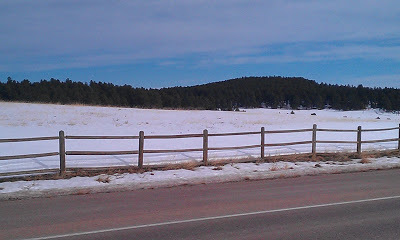

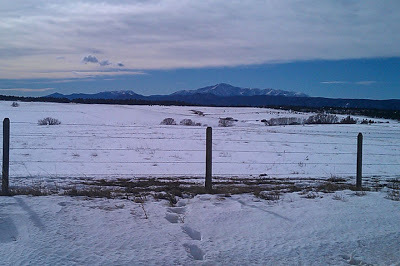

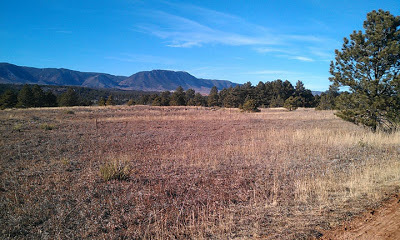
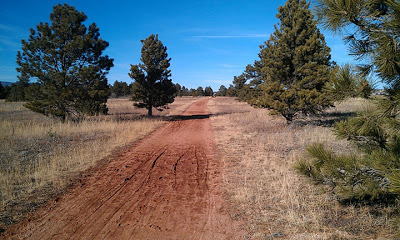

And sometimes she stops for more than just taking a picture:
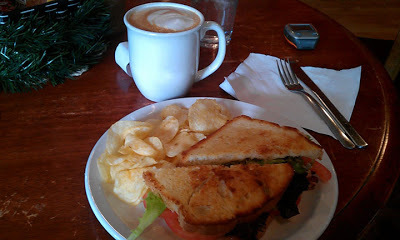
Like this post? Please share by clicking one of the links below.







And sometimes she stops for more than just taking a picture:

Like this post? Please share by clicking one of the links below.
Published on January 20, 2012 04:00
January 19, 2012
Responsible Reviewing, Part 2
What I'm reading: Hotel on the Corner of Bitter and Sweet, by Jamie Ford (book club); Contest entry #1 of 8.
 After the discussion in the comments on
Monday's post
about reviews, I decided to carry it one step further. Since there does seem to be a lot of abuse of the review system, I went to both the Barnes & Noble and Amazon sites to see what they said about leaving reviews.
After the discussion in the comments on
Monday's post
about reviews, I decided to carry it one step further. Since there does seem to be a lot of abuse of the review system, I went to both the Barnes & Noble and Amazon sites to see what they said about leaving reviews.
Barnes & Noble (where there's still a lengthy discussion of sick cats on my Danger in Deer Ridge page) does seem to be trying to guide reviewers as to what's appropriate . This is from their site:
What to include in your review:
Please focus on the title's content. Your review will be most helpful to others if you include the reasons why you either liked or disliked the title. Hold your readers' full attention by limiting your review to 500 words or less.
What to exclude from your review:
Don't ruin the ending for others, and please do not write about reviews, commentary, or information posted on the title page. If you see any errors in the information on the title page, please send us an email.
Reviews should not contain any of the following:
HTML tags
Profanity, obscenities, or vulgarities
Comments that defame anyone
Time-sensitive information such as tour dates, signings, lectures, etc.
Single-word reviews. Other people will read your review to discover why you liked or didn't like the title. Be descriptive.
Comments focusing on the author
Comments that may ruin the ending for others
Phone numbers, addresses, URLs
Pricing and availability information or alternative ordering information
Advertisements or commercial solicitation
Then, if you want to flag a review as inappropriate, you'll get the following choices to click:
Inappropriate or abusive language
Off-topic content
Spam, private or commercial solicitation
Suspected underage user
Terms of Use Violation
Suspected copyright infringement
But what happens when you flag a review? Who knows? I flagged the ones on my book, and as of yesterday, they're still there.
Amazon, on the other hand, is much less detailed. There's a button by the reviews that says: Report this content as inappropriate on the site
Clicking it will take you to the following message:
If you find this content inappropriate and think it should be removed from the Amazon.com site, let us know by clicking the button below. This information will be sent to Amazon.com and we will take appropriate action.
What their idea of "appropriate action" is, and how long it takes to get it implemented is another question entirely. Nor do they say who "we" is. (are?)
Tomorrow, we're going biking with Nicole.
Like this post? Please share by clicking one of the links below.
 After the discussion in the comments on
Monday's post
about reviews, I decided to carry it one step further. Since there does seem to be a lot of abuse of the review system, I went to both the Barnes & Noble and Amazon sites to see what they said about leaving reviews.
After the discussion in the comments on
Monday's post
about reviews, I decided to carry it one step further. Since there does seem to be a lot of abuse of the review system, I went to both the Barnes & Noble and Amazon sites to see what they said about leaving reviews. Barnes & Noble (where there's still a lengthy discussion of sick cats on my Danger in Deer Ridge page) does seem to be trying to guide reviewers as to what's appropriate . This is from their site:
What to include in your review:
Please focus on the title's content. Your review will be most helpful to others if you include the reasons why you either liked or disliked the title. Hold your readers' full attention by limiting your review to 500 words or less.
What to exclude from your review:
Don't ruin the ending for others, and please do not write about reviews, commentary, or information posted on the title page. If you see any errors in the information on the title page, please send us an email.
Reviews should not contain any of the following:
HTML tags
Profanity, obscenities, or vulgarities
Comments that defame anyone
Time-sensitive information such as tour dates, signings, lectures, etc.
Single-word reviews. Other people will read your review to discover why you liked or didn't like the title. Be descriptive.
Comments focusing on the author
Comments that may ruin the ending for others
Phone numbers, addresses, URLs
Pricing and availability information or alternative ordering information
Advertisements or commercial solicitation
Then, if you want to flag a review as inappropriate, you'll get the following choices to click:
Inappropriate or abusive language
Off-topic content
Spam, private or commercial solicitation
Suspected underage user
Terms of Use Violation
Suspected copyright infringement
But what happens when you flag a review? Who knows? I flagged the ones on my book, and as of yesterday, they're still there.
Amazon, on the other hand, is much less detailed. There's a button by the reviews that says: Report this content as inappropriate on the site
Clicking it will take you to the following message:
If you find this content inappropriate and think it should be removed from the Amazon.com site, let us know by clicking the button below. This information will be sent to Amazon.com and we will take appropriate action.
What their idea of "appropriate action" is, and how long it takes to get it implemented is another question entirely. Nor do they say who "we" is. (are?)
Tomorrow, we're going biking with Nicole.
Like this post? Please share by clicking one of the links below.
Published on January 19, 2012 04:00
January 18, 2012
What's Cooking Wednesday - Herb Crusted Pork Tenderloin
Thanks to Sue for those safety tips, and I hope you don't have to use them.
Next – I have a request for help. Someone in our community fell and broke her leg, and neighbors are pitching in to bring her food. The catch is that she and her husband are both on gluten free diets, and I need a gluten free dessert recipe. Something simple. If you've got one and would be willing to share, I'd love to have it. Thanks. Email it to me via the contact tab. (Click on "email" for the link)
This week's recipe is an adaptation of a recipe I found on the web. It's super quick to prepare, and you can vary it to your own taste.
Herb Crusted Pork Tenderloin with Fruit Preserve Glaze
Ingredients:
1 whole pork tenderloin
Olive oil
Salt
Pepper
4-5 T mixed herbs – this is where you can play around a bit. The recipe called for Herbs De Provence. I didn't have any, so I looked it up to see if could wing it. According to Emeril Lagasse, it's equal parts of the following:
dried savory
dried rosemary
dried thyme
dried oregano
dried basil
dried marjoram
fennel seed
Another source said it included lavender as well.
As far as I'm concerned, you can blend any favorite spices. I used what I had on hand, which ended up being dried parsley, rosemary, basil, oregano, and thyme.
Directions:
Blend all your spices and salt and pepper together. If you're using dried rosemary leaves, you should crush them first to avoid being poked in the mouth.
Preheat oven to 425
Rub the pork with olive oil, then press the herb mixture all over the meat to coat it. Put the pork either in a roasting pan on a rack, or in a skillet. Roast in the oven for 15-20 minutes or until the meat is no longer pink (or to an internal temperature of 145 degrees). Remove from oven, cover with foil and let it rest 10 minutes.
Glaze:
1 c jam or preserves of your choice. I used apricot, but the original recipe also suggested fig, peach, or plum.
½ c water
1 T vinegar
Mix all ingredients together in a saucepan and bring to a simmer. While the pork cooks, let it reduce until it's a nice glaze consistency.
Slice the pork and spoon the glaze over the slices.
Great with potatoes. I baked mine, but mashed would be good, too. And apologies for the lack of a picture, but it was so yummy, my plate was half-empty before I remembered I should have taken one.
Like this post? Please share by clicking one of the links below.
Next – I have a request for help. Someone in our community fell and broke her leg, and neighbors are pitching in to bring her food. The catch is that she and her husband are both on gluten free diets, and I need a gluten free dessert recipe. Something simple. If you've got one and would be willing to share, I'd love to have it. Thanks. Email it to me via the contact tab. (Click on "email" for the link)
This week's recipe is an adaptation of a recipe I found on the web. It's super quick to prepare, and you can vary it to your own taste.
Herb Crusted Pork Tenderloin with Fruit Preserve Glaze
Ingredients:
1 whole pork tenderloin
Olive oil
Salt
Pepper
4-5 T mixed herbs – this is where you can play around a bit. The recipe called for Herbs De Provence. I didn't have any, so I looked it up to see if could wing it. According to Emeril Lagasse, it's equal parts of the following:
dried savory
dried rosemary
dried thyme
dried oregano
dried basil
dried marjoram
fennel seed
Another source said it included lavender as well.
As far as I'm concerned, you can blend any favorite spices. I used what I had on hand, which ended up being dried parsley, rosemary, basil, oregano, and thyme.
Directions:
Blend all your spices and salt and pepper together. If you're using dried rosemary leaves, you should crush them first to avoid being poked in the mouth.
Preheat oven to 425
Rub the pork with olive oil, then press the herb mixture all over the meat to coat it. Put the pork either in a roasting pan on a rack, or in a skillet. Roast in the oven for 15-20 minutes or until the meat is no longer pink (or to an internal temperature of 145 degrees). Remove from oven, cover with foil and let it rest 10 minutes.
Glaze:
1 c jam or preserves of your choice. I used apricot, but the original recipe also suggested fig, peach, or plum.
½ c water
1 T vinegar
Mix all ingredients together in a saucepan and bring to a simmer. While the pork cooks, let it reduce until it's a nice glaze consistency.
Slice the pork and spoon the glaze over the slices.
Great with potatoes. I baked mine, but mashed would be good, too. And apologies for the lack of a picture, but it was so yummy, my plate was half-empty before I remembered I should have taken one.
Like this post? Please share by clicking one of the links below.
Published on January 18, 2012 04:00
January 17, 2012
Self Defense for Klutzes
Today my guest is author Sue Star. Sue writes mysteries about families in chaos. In real life, she teaches young adults, and in her leisure time, she enjoys hiking, skiing, martial arts, and hanging out with her family. Her novel, Murder in the Dojo, the first of the black belt mystery series, is newly released from D.M. Kreg Publishing.
And while Sue is here at Terry's Place, I'm a guest at Sarah Grimm's blog. And, on top of that, it's my day over at The Blood-Red Pencil where I'm talking about the apostrophe. Hope you'll pop over for a peek and say hello.
A word of warning! If you don't have the proper training, then we recommend that you not try playing ninja at home. Some of the martial arts techniques we have to use are pretty darned complicated, and my fictional characters and I have been practicing them for years.
Aside from fancy techniques, here are four basic safety rules that everyone should follow. Yes, staying alert to basic safety is the real secret behind self defense.
First: Avoid trouble. This is the number one rule! Another way to put this, as my sensei would say: don't be stupid. Stay away from dark alleys. If you have to walk in unlighted areas (as we've all been known to do from time to time), then walk in the middle of the sidewalk, not next to dark bushes or parked cars where thugs can hide.
Second: Don't look like a victim. Always show confidence (whether or not you feel it). Walk with head held high, chin up, back straight. Thugs look for victims; they don't want to tangle with confident types.
Third: If the first and second rules don't work, then use your lungs. Scream! Thugs don't like witnesses, and screams bring witnesses to the scene.
Fourth: Remember to always carry your car keys in your hands (not lost at the bottom of your purse or pocket) as you walk toward your car. Better yet, splay the keys between your fingers to make a fist your thug will not want to meet.
Okay, so those are just basic safety rules. But what about actual self defense? Here's a simple trick that even non-ninjas can use if they have to (heaven forbid):

If all else fails, you might be able to make a thug release a grip on you by jabbing the soft spot in the thug's neck. This is the soft windpipe spot where the neck meets the breastbone, as seen in the illustration.
These are only a few of the many tips for self defense that a non-practicing martial artist can use. Safety and being aware of your surroundings is an easy way to begin. Good luck, have fun, and remember to stay out of trouble!
Murder in the Dojo, by Sue Star, can be purchased at any bookstore. ISBN: 9780615570723. To find out more, see her publisher's website at www.dmkregpublishing.com
And while Sue is here at Terry's Place, I'm a guest at Sarah Grimm's blog. And, on top of that, it's my day over at The Blood-Red Pencil where I'm talking about the apostrophe. Hope you'll pop over for a peek and say hello.
A word of warning! If you don't have the proper training, then we recommend that you not try playing ninja at home. Some of the martial arts techniques we have to use are pretty darned complicated, and my fictional characters and I have been practicing them for years.
Aside from fancy techniques, here are four basic safety rules that everyone should follow. Yes, staying alert to basic safety is the real secret behind self defense.
First: Avoid trouble. This is the number one rule! Another way to put this, as my sensei would say: don't be stupid. Stay away from dark alleys. If you have to walk in unlighted areas (as we've all been known to do from time to time), then walk in the middle of the sidewalk, not next to dark bushes or parked cars where thugs can hide.
Second: Don't look like a victim. Always show confidence (whether or not you feel it). Walk with head held high, chin up, back straight. Thugs look for victims; they don't want to tangle with confident types.
Third: If the first and second rules don't work, then use your lungs. Scream! Thugs don't like witnesses, and screams bring witnesses to the scene.
Fourth: Remember to always carry your car keys in your hands (not lost at the bottom of your purse or pocket) as you walk toward your car. Better yet, splay the keys between your fingers to make a fist your thug will not want to meet.
Okay, so those are just basic safety rules. But what about actual self defense? Here's a simple trick that even non-ninjas can use if they have to (heaven forbid):

If all else fails, you might be able to make a thug release a grip on you by jabbing the soft spot in the thug's neck. This is the soft windpipe spot where the neck meets the breastbone, as seen in the illustration.
These are only a few of the many tips for self defense that a non-practicing martial artist can use. Safety and being aware of your surroundings is an easy way to begin. Good luck, have fun, and remember to stay out of trouble!
Murder in the Dojo, by Sue Star, can be purchased at any bookstore. ISBN: 9780615570723. To find out more, see her publisher's website at www.dmkregpublishing.com
Published on January 17, 2012 04:00
January 16, 2012
Responsible Reviewing
What I'm reading: Of Noble Birth, by Brenda Novak (Nook); Viscount Breckenridge to the Rescue, by Stephanie Laurens (bike).
Side note: Last week, all my "likes" in the sidebar disappeared. I have no clue as to why. But it looks so sad, with nobody liking my blog. If you're so inclined, a click would be much appreciated.
 There was some discussion about reviews triggered by offering books for free on the new Kindle Select Program. Being able to get books for free at Amazon was one of the "selling points" for signing up with the new program, as it generates more exposure.
There was some discussion about reviews triggered by offering books for free on the new Kindle Select Program. Being able to get books for free at Amazon was one of the "selling points" for signing up with the new program, as it generates more exposure.
Note: for a myriad reasons, I did NOT opt to join this program, but that's a subject for another post, another day.
One complaint voiced in the discussion was that people were reading books out of their genre, and then giving poor reviews because they didn't like the genre. To me, this is NOT a valid reason for a poor review.
Since I joined a local book club, I've been reading books outside my genres of choice. This month's selection is totally outside my preferred reading. It's literary fiction, and I prefer my books to have an actual plot (or at least one I can follow). Where I can care about the characters. Where I want to know what happens next. Not so in this book. But although I'll give it a low score when the book club meets, because the criteria there is, "Did you like it?" I would never consider giving it a negative review on a review site. To me, a review isn't "I liked the book" as much as it is, "This is WHY I liked the book" or "These are the plusses and minuses of this book."
The book club choice is well-written, by a Big Name best-selling author. I can't find fault with it given the parameters of the genre. The fact that I don't like it really shouldn't enter into the equation when evaluating the writing. The "rules" are different in literary fiction.
Likewise, I also downloaded a free book in the romantic suspense genre. I wasn't paying a lot of attention to the blurb. If I had, I might have noticed it was labeled "inspirational" and probably would have given it a pass. Although closer to my genres of choice, I'm not big on religion in books. However, I would think it highly improper to post a review and say the Christian themes made it a bad book.
I think a reviewer owes it to the readers (and the author) to be fair and objective. If you don't like the theme of a book, say so, although again, why did you choose to read it in the first place? Be fair to those who might be using your review to decide whether they want to read a book. They may love Christian themes. Or literary fiction.
I received a less than stellar review recently, but the reviewer was honest and fair about the reasons the book didn't work for her/him, including the fact that there was too much time spent (in the reviewer's opinion) on the developing relationships between the characters. This way, someone else can look at the review and say, "But I DO like relationships in mystery books, so I'll give this a try." And, as more people (I hope) post reviews, readers will be able to compare and make their own choices.
And then I found a totally new use for reader reviews at the e-book stores. I noticed I'd received 14 reviews for one of my books at B&N. Now, I don't usually get more than 5 reviews for any of my titles, so I went to read them. For whatever reason, a group of people were using the review page to post private conversations about sick cats. (Not that there were even cats in the book in question!) Granted, they were posting 5 stars before leaving their comments, but that was a new one to me. Reviews as Instant Messaging?
Tomorrow my guest, Sue Star, will be sharing some self-defense tips. Well worth reading!
Like this post? Please share by clicking one of the links below.
Side note: Last week, all my "likes" in the sidebar disappeared. I have no clue as to why. But it looks so sad, with nobody liking my blog. If you're so inclined, a click would be much appreciated.
 There was some discussion about reviews triggered by offering books for free on the new Kindle Select Program. Being able to get books for free at Amazon was one of the "selling points" for signing up with the new program, as it generates more exposure.
There was some discussion about reviews triggered by offering books for free on the new Kindle Select Program. Being able to get books for free at Amazon was one of the "selling points" for signing up with the new program, as it generates more exposure.Note: for a myriad reasons, I did NOT opt to join this program, but that's a subject for another post, another day.
One complaint voiced in the discussion was that people were reading books out of their genre, and then giving poor reviews because they didn't like the genre. To me, this is NOT a valid reason for a poor review.
Since I joined a local book club, I've been reading books outside my genres of choice. This month's selection is totally outside my preferred reading. It's literary fiction, and I prefer my books to have an actual plot (or at least one I can follow). Where I can care about the characters. Where I want to know what happens next. Not so in this book. But although I'll give it a low score when the book club meets, because the criteria there is, "Did you like it?" I would never consider giving it a negative review on a review site. To me, a review isn't "I liked the book" as much as it is, "This is WHY I liked the book" or "These are the plusses and minuses of this book."
The book club choice is well-written, by a Big Name best-selling author. I can't find fault with it given the parameters of the genre. The fact that I don't like it really shouldn't enter into the equation when evaluating the writing. The "rules" are different in literary fiction.
Likewise, I also downloaded a free book in the romantic suspense genre. I wasn't paying a lot of attention to the blurb. If I had, I might have noticed it was labeled "inspirational" and probably would have given it a pass. Although closer to my genres of choice, I'm not big on religion in books. However, I would think it highly improper to post a review and say the Christian themes made it a bad book.
I think a reviewer owes it to the readers (and the author) to be fair and objective. If you don't like the theme of a book, say so, although again, why did you choose to read it in the first place? Be fair to those who might be using your review to decide whether they want to read a book. They may love Christian themes. Or literary fiction.
I received a less than stellar review recently, but the reviewer was honest and fair about the reasons the book didn't work for her/him, including the fact that there was too much time spent (in the reviewer's opinion) on the developing relationships between the characters. This way, someone else can look at the review and say, "But I DO like relationships in mystery books, so I'll give this a try." And, as more people (I hope) post reviews, readers will be able to compare and make their own choices.
And then I found a totally new use for reader reviews at the e-book stores. I noticed I'd received 14 reviews for one of my books at B&N. Now, I don't usually get more than 5 reviews for any of my titles, so I went to read them. For whatever reason, a group of people were using the review page to post private conversations about sick cats. (Not that there were even cats in the book in question!) Granted, they were posting 5 stars before leaving their comments, but that was a new one to me. Reviews as Instant Messaging?
Tomorrow my guest, Sue Star, will be sharing some self-defense tips. Well worth reading!
Like this post? Please share by clicking one of the links below.
Published on January 16, 2012 04:00
January 13, 2012
Friday Field Trip - Landmarks
When I put out my request for picture sharing, my faithful mom sent along some of her travel photos. Her theme was going to be clocks, but she said she didn't have enough of them, so she sent some "untimely" ones to fill out the post. She told me to let my readers figure out where they were taken. So, have at it.
Oh, and do you suffer from Triskaidekaphobia? If so, you might want to stay in bed today.






Like this post? Please share by clicking one of the links below.
Oh, and do you suffer from Triskaidekaphobia? If so, you might want to stay in bed today.






Like this post? Please share by clicking one of the links below.
Published on January 13, 2012 04:00
January 12, 2012
Words
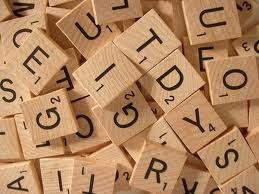 Recently, I was hornswoggled coerced invited to play Words With Friends, which, if you haven't heard of it, is an on-line Scrabble game, where you play against another opponent. As time sucks go, it probably has slightly more redeeming value than Angry Birds.
Recently, I was hornswoggled coerced invited to play Words With Friends, which, if you haven't heard of it, is an on-line Scrabble game, where you play against another opponent. As time sucks go, it probably has slightly more redeeming value than Angry Birds. I also subscribe to the "Word of the Day" from Dictionary.com, and I get a random vocabulary word in my email each day. I post these to my Facebook wall, and some of my readers over there have fun coming up with alternative definitions.
Now, knowing obscure words might help when you're playing Scrabble. (Especially if you're savvy enough to understand the strategy of using all those bonus scoring spots on the board—I'm not.) And what about knowing the meaning of those Words of the Day?
As writers, aren't we supposed to know lots of fancy words? Maybe, especially if we're writing literary fiction. And even in genre, or commercial fiction, knowing a variety of words can keep us from having to repeat the same word over and over.
But…
If our readers aren't familiar with the words, we've lost them. If the words aren't appropriate to the characters, we're pulling readers out of the story. I remember very early on when I was learning the craft, I had a young character trapped in a dark basement. My scientific background came into play as I tried to figure out what he would do in that situation. However having him "walk transects of the room seeking a method of egress" brought forth immediate and vehement protests from my beta readers. Transects? Egress? What teenaged boy would know or think in those terms?
Another example: The protagonist in a best-selling author's series had a vocabulary which didn't seem to ring true to the background the author provided--until the 4th book (or so) into the series where the character explained having spent long hours in the library as a child. For me, it would have made the first 3 books clearer had the author tossed that tidbit out there in book 1, because until that point, it sounded a lot more like the author talking than the character.
Lesson learned. Vocabulary has to be true to your POV character. And even if your character is an erudite professor of literature, or ancient history, or physics, if you have him speaking in his own jargon, it's probably not going to fly with your readers unless you make sure it's in context and somehow explained in the scene.
Tomorrow, we're going globe-trotting with my mom.
Like this post? Please share by clicking one of the links below.
Published on January 12, 2012 04:00



